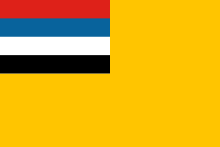Five Races Under One Union (Manchukuo)
Appearance
| Five Races Under One Union | |||||||||
|---|---|---|---|---|---|---|---|---|---|
 The National Flag of Manchukuo | |||||||||
| Chinese name | |||||||||
| Traditional Chinese | 五族協和 | ||||||||
| Simplified Chinese | 五族协和 | ||||||||
| |||||||||
| Korean name | |||||||||
| Hangul | 오족협화 | ||||||||
| Hanja | 五族協和 | ||||||||
| |||||||||
| Japanese name | |||||||||
| Kanji | 五族協和 | ||||||||
| Hiragana | ごぞくきょうわ | ||||||||
| |||||||||
Five Races Under One Union (Chinese: 五族協和, Japanese: 五族協和) was used as a national motto in Manchukuo, for the five ethnic groups of the Manchus, the Japanese, the Han Chinese, the Mongols and the Koreans. It was similar to the "Five Races Under One Union" (Chinese: 五族共和) motto used by the Republic of China, for the Han, Manchus, Hui, Mongols and Tibetans, but the third of the four Chinese characters was changed from Togetherness (共) to Cooperation (協). Both mottoes were pronounced the same "Go zoku kyōwa" in Japanese.
This motto was symbolized in the national flag of Manchukuo, as the yellow base color (Manchus) with four striped colors in the upper left corner: red (Japanese), blue (Han Chinese), white (Mongols) and black (Koreans).[1]
Gallery
[edit]-
Manchuria Aviation Company roundel, 1931–1945
-
War ensign of Manchukuo, 1932–1945
-
Manchukuo Army insignia, 1932–1945
-
Manchukuo Air Force roundel, 1937–1945
-
Central Bank of Manchou 1 yuan banknote, 1932
-
Commemorative stamp propagating the "Concord of Nationalities"
-
"With the cooperation of Japan, China, and Manchukuo the world can be in peace," 1935
-
South Chahar Autonomous Government propaganda, c. 1937–1939
References
[edit]








